The final Top 10 lists from Shelf
Awareness folk... (see here, here and here for the rest).
Top 10 Books of 2010: John Mutter,
editor-in-chief
Matterhorn by Karl Marlantes (Atlantic
Monthly/El Leon Literary Arts). Who thought a novel starring American marines
during the Vietnam War could cover new ground? And a wonderful publishing
story. Otherwise, what my colleagues have said.
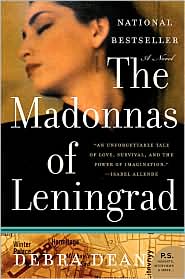 The Madonnas of Leningrad by Debra Dean (Harper
Perennial). The part of this book set in the "present" nicely
captures the bizarre, fascinating aspects of Alzheimer's, including the lack of
filters and the way pieces of memory flow in new ways--while the basic story,
set during the Siege of Leningrad in World War II, is gripping. Marina is a
guide at the Hermitage, and helps evacuate most of its treasures. Left to take
care of the famous museum, Marina continues to give tours for herself and
others, describing in detail artwork that once hung on the empty walls. If she
and others remember, certainly the treasures continue to exist.
The Madonnas of Leningrad by Debra Dean (Harper
Perennial). The part of this book set in the "present" nicely
captures the bizarre, fascinating aspects of Alzheimer's, including the lack of
filters and the way pieces of memory flow in new ways--while the basic story,
set during the Siege of Leningrad in World War II, is gripping. Marina is a
guide at the Hermitage, and helps evacuate most of its treasures. Left to take
care of the famous museum, Marina continues to give tours for herself and
others, describing in detail artwork that once hung on the empty walls. If she
and others remember, certainly the treasures continue to exist.
Pravda by Edward Docx (Mariner Books).
This is a great portrayal of the bleaker side of modern-day St. Petersburg (although much action takes
place in New York, London and Paris). None of the characters--Russians and
Brits--are particularly appealing, yet they are smart, deep, fascinating and
mysterious. Their perplexing story has roots satisfyingly deep in the Soviet
era.
Just Kids by Patti Smith (Ecco). The
writing is choppy at times, but this is a wonderful memoir of a deep, loving,
unusual relationship that had so much to do with Smith and Robert Mapplethorpe
encouraging each other artistically and helping each other find their creative
paths, wherever they led. Just Kids
struck a chord: the book won the National Book Award for nonfiction and the New
Atlantic Independent Booksellers Association Nonfiction Book of the Year award.
 Wallflower by Holly-Jane Rahlens (Berlinica
Publishing). The debut title by a new U.S. press specializing in books about
Berlin, this YA novel with its smart, poignant, wisecracking voice works for
adults, too. Wallflower takes place
during the course of a day two weeks after the fall of the Wall in 1989, when
Molly Lenzfeld, who is about to return to New York, decides to visit newly
opened East Berlin to see the house where her late mother, who was Jewish,
lived before fleeing the Nazis. On her long, convoluted trip via subway to the
east, she meets Mick, an East German boy a few years older--and her life
changes forever.
Wallflower by Holly-Jane Rahlens (Berlinica
Publishing). The debut title by a new U.S. press specializing in books about
Berlin, this YA novel with its smart, poignant, wisecracking voice works for
adults, too. Wallflower takes place
during the course of a day two weeks after the fall of the Wall in 1989, when
Molly Lenzfeld, who is about to return to New York, decides to visit newly
opened East Berlin to see the house where her late mother, who was Jewish,
lived before fleeing the Nazis. On her long, convoluted trip via subway to the
east, she meets Mick, an East German boy a few years older--and her life
changes forever.
Bangkok Tattoo by John Burdett (Vintage). A
savory follow-up to Bangkok 8, both
of which feature devout Buddhist Thai detective Sonchai Jitpleecheep, whose
mother and whose boss, Colonel Vikorn, are co-owners of a brothel. Jitpleecheep
is "asked" by Colonel Vikorn to work on a case that involves a dead
CIA agent, which brings Westerners and their perplexing behavior into the mix.
Reading these books is a body and soul experience: what better way to consider
Buddhist approaches to life than in such a chaotic, beautiful, sweaty tale?
The Wordy Shipmates by Sarah Vowell (Riverhead). In
decidedly modern language, Vowell surveys the Puritans, who she finds
surprisingly sympathetic. Prim stereotypes aside, the Puritans loved the
written word, they had deep, often admirable beliefs and they had passionate,
occasionally bloody disputes about how to live proper lives.
Suite Francaise by Irene Nemirovsky (Vintage
International). A sprawling novel set during the fall of France in 1940 that
Nemirovsky wrote while in flight as Nazi soldiers advanced. Tragically, she was
captured and died in Auschwitz, but her daughters kept the manuscript, which
was published for the first time only in 2004.
Before the Frost by Henning Mankell (Vintage
Crime). Another year, another Kurt Wallander mystery. For me, these need to be
rationed because of the gloomy, often flat narrative. Still, the grind is
rewarding, and once 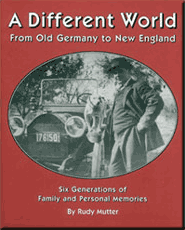 again, in Before the
Frost, set on Wallander's home ground of Skåne in southern Sweden, Mankell
tells a gripping story, which in this case involves an extreme religious group
bent on punishing sinners. The addition of Wallander's daughter to the police
force and the series is brilliant and leavening.
again, in Before the
Frost, set on Wallander's home ground of Skåne in southern Sweden, Mankell
tells a gripping story, which in this case involves an extreme religious group
bent on punishing sinners. The addition of Wallander's daughter to the police
force and the series is brilliant and leavening.
A Different World: From Old
Germany to New England
by Rudy Mutter (self-published). Family stories: a lovely way to remember the
old tales and still hear his voice.
---
Top 10 Books of 2010: Jennifer M. Brown, children's editor
In a year
of abundance, a baker's dozen.
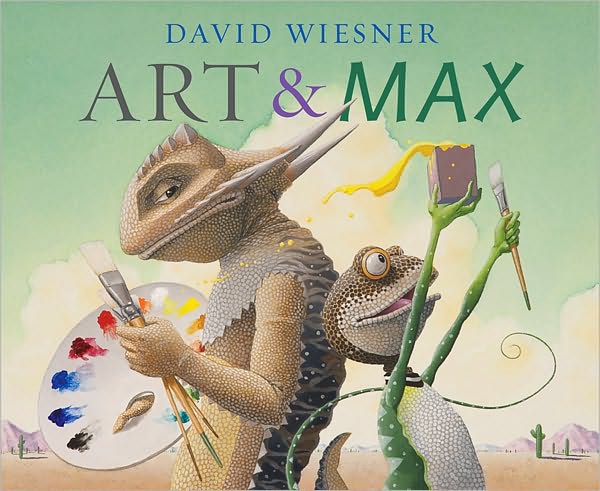 Art & Max by David Weisner (Clarion/HMH). A
master picture book maker and three-time Caldecott Medalist reminds us that no
matter how skilled and experienced we may become, the beginner always has much
to teach us about open-mindedness and experimentation.
Art & Max by David Weisner (Clarion/HMH). A
master picture book maker and three-time Caldecott Medalist reminds us that no
matter how skilled and experienced we may become, the beginner always has much
to teach us about open-mindedness and experimentation.
A Ballet for Martha: The Making
of Appalachian Spring by Jan Greenberg and
Sandra Jordan, illustrated by Brian Floca (Neal Porter/Roaring Brook/Macmillan).
In this glorious picture book, the story of how Martha Graham, Aaron Copland
and Isamu Noguchi came together to create a uniquely American ballet becomes an
ode to creativity, innovation and--appropriately--the pioneer. As spare and as
graceful as the dance it celebrates.
Bunny Days by Tao Nyeu (Dial/Penguin). With
a simplicity of plot and palette that calls to mind the work of Dorothy
Kunhardt, Tao Nyou's picture book takes a fresh approach to a trio of tales
about a sextet of bunnies and their snow-white (genderless) ursine guardian,
who ceaselessly shows them unconditional love.
Heart of a Samurai by Margi Preus (Amulet/Abrams). A
14-year-old Japanese fisherman rescued by an American whaling ship in the 1840s
finds that these men are not as barbaric as he's been taught. Based on the true
story of John Mung (born Manjiro) and liberally illustrated with his own
drawings, this novel of an extraordinary quest chronicles how one man built a
bridge between Eastern and Western cultures.
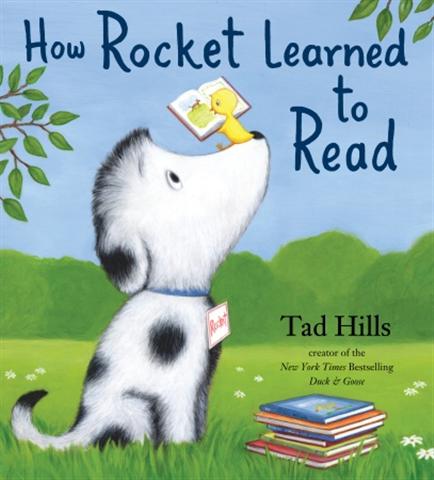 How Rocket Learned to Read by Tad Hills (Schwartz &
Wade/Random House). A "little yellow bird" in search of a student
sets her sights on Rocket, a black-and-white dog who loves to nap. The
passionate teacher awakens the pup to "the wondrous, mighty, gorgeous
alphabet" and the rewards of reading and friendship.
How Rocket Learned to Read by Tad Hills (Schwartz &
Wade/Random House). A "little yellow bird" in search of a student
sets her sights on Rocket, a black-and-white dog who loves to nap. The
passionate teacher awakens the pup to "the wondrous, mighty, gorgeous
alphabet" and the rewards of reading and friendship.
Ling & Ting by Grace Lin (Little, Brown). Identical
twins with delightfully different personalities lead beginning readers through
a quintet of stories by the Newbery honor author and gifted artist. Humor and
surprise twists abound.
One Crazy Summer by Rita Williams-Garcia
(Amistad/HarperCollins). Eleven-year-old Delphine and her two younger sisters
travel from the Brooklyn home they share with their father, to Oakland, Calig.,
to spend the summer of 1968 with the mother who abandoned them seven years
before. In this National Book Award finalist, we see the larger political scene
through Delphine's eyes, as she and her sisters attend a camp run by the Black
Panthers. We also witness a girl struggling to understand and forgive a mother
who needed to raise herself before she could raise her children.
Out of My Mind by Sharon Draper
(Atheneum/S&S). Through a first-person narrative, the author inhabits the
brilliant, frustrated mind and unresponsive body of nearly 11-year-old Melody
Brooks, who suffers from cerebral palsy. The heroine's struggle to make herself
known, with all of her exceptional intelligence and wit, is a journey well
worth taking and will leave you with a wider world view.
A Tale Dark & Grimm by Adam Gidwitz (Dutton/Penguin).
Oh what a treat awaits those readers not yet ready for Lemony Snicket and his
Unfortunate Events (and also those who are). Here is a narrator to love,
telling small children to leave the room--oh the blood, the gore! And, let's
face it, the Brothers Grimm wrote gore galore. Hansel and Gretel get larger
roles in this drama, and you will see tales you thought you knew in a brand new
light. But not too much light: this one youngsters will want to read by
flashlight under the covers.
There's Going to Be a Baby by John Burningham, illustrated
by Helen Oxenbury (Candlewick). If Mem Fox and Helen Oxenbury created the
definitive book for babies with Ten
Little Fingers and Ten Little Toes, then Oxenbury together with her husband
John Burningham do the same for a child expecting a new sibling. Perfection.
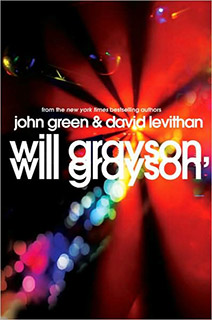 Will Grayson, Will Grayson by John Green and David Levithan
(Dutton/Penguin). Two high school students with the same name meet by
happenstance in a Chicago porn shop. Although they could not be more different,
both Will Graysons will never be the same, due to an irresistible,
larger-than-life gay football player and musical theater genius named Tiny
(picture George Hearn in La Cage Aux
Folles as a young man). Green and Levithan alternate narratives and offer
comic moments and rare insights into male-male and male-female intimacy--of
both the platonic and romantic varieties.
Will Grayson, Will Grayson by John Green and David Levithan
(Dutton/Penguin). Two high school students with the same name meet by
happenstance in a Chicago porn shop. Although they could not be more different,
both Will Graysons will never be the same, due to an irresistible,
larger-than-life gay football player and musical theater genius named Tiny
(picture George Hearn in La Cage Aux
Folles as a young man). Green and Levithan alternate narratives and offer
comic moments and rare insights into male-male and male-female intimacy--of
both the platonic and romantic varieties.
Zora & Me by Victoria Bond and T.R. Simon
(Candlewick) and The Dreamer by Pam
Muñoz Ryan, illustrated by Peter Sís (Scholastic). These two extraordinary
novels plumb the childhoods of two literary greats. Within the framework of a
mystery, Zora & Me imagines the
childhood that shaped the philosophy and writing of Zora Neale Hurston. The Dreamer suggests the underpinnings
of the gifted poet and activist Neftalí Reyes, whom we know as Pablo Neruda,
with illustrations that hint at the magical realism in his poetry. These are
books for the gifted young artists in your life, marching to their own music;
they are not alone.
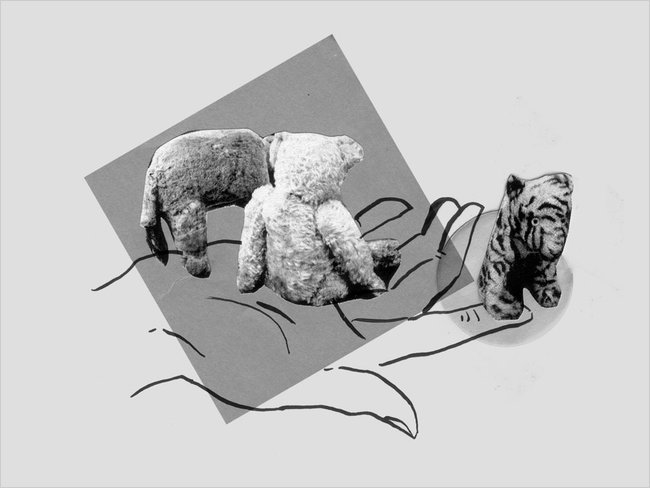 "On that December day last year, my friend and I headed out into Midtown. New York was all dressed up for Christmas. There on the corner was the restaurant where my father used to take me. There was the Daily News building, where I had a job in 1984. There was the lollipop street clock at 43rd Street and Fifth Avenue where my sister and I used to meet. I haven’t seen her in a long time.
"On that December day last year, my friend and I headed out into Midtown. New York was all dressed up for Christmas. There on the corner was the restaurant where my father used to take me. There was the Daily News building, where I had a job in 1984. There was the lollipop street clock at 43rd Street and Fifth Avenue where my sister and I used to meet. I haven’t seen her in a long time.









 Amazon may sell more than 8 million Kindles this year, "at least 60% percent more than analysts have predicted, according to two people who are aware of the company's sales projections,"
Amazon may sell more than 8 million Kindles this year, "at least 60% percent more than analysts have predicted, according to two people who are aware of the company's sales projections," 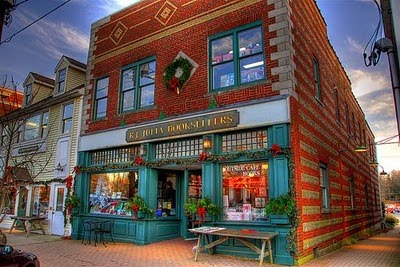 Cool idea of the holiday season:
Cool idea of the holiday season: 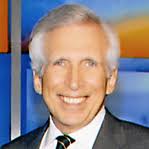 Osnos also noted that the e-book boom has become less of a disadvantage for indie booksellers because they "are beginning to join, basically, the parade. They understand the need to serve the customer in all the ways the customer wants to be served. If somebody comes in and asks for a book, the last thing they want to be told is: You can't have it. So what I think is developing is a sense that every transaction that takes place in a bookstore or online can be closed, that if you think you want to read a book, the odds are, overwhelmingly, you'll be able to do it, sometimes, usually in under a minute."
Osnos also noted that the e-book boom has become less of a disadvantage for indie booksellers because they "are beginning to join, basically, the parade. They understand the need to serve the customer in all the ways the customer wants to be served. If somebody comes in and asks for a book, the last thing they want to be told is: You can't have it. So what I think is developing is a sense that every transaction that takes place in a bookstore or online can be closed, that if you think you want to read a book, the odds are, overwhelmingly, you'll be able to do it, sometimes, usually in under a minute."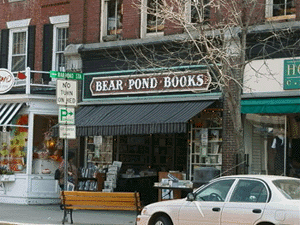 "What people come to us for is for the customer service and the feel of the old style bookstore," said Claire Benedict, co-owner of Bear Pond Books, Montpelier, Vt., told
"What people come to us for is for the customer service and the feel of the old style bookstore," said Claire Benedict, co-owner of Bear Pond Books, Montpelier, Vt., told 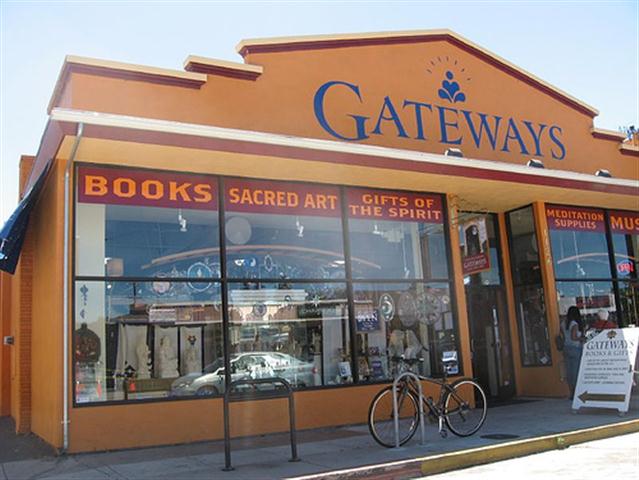
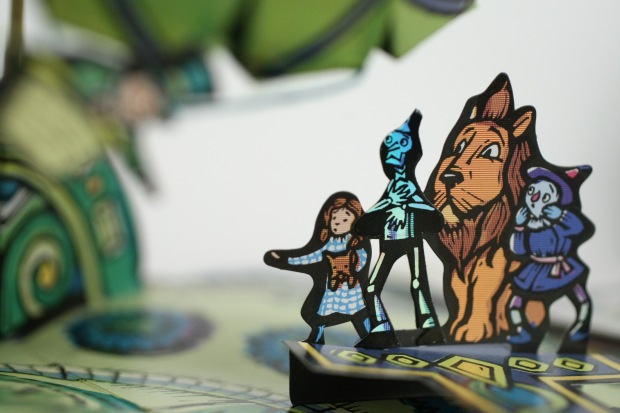 Robert Sabuda, "the superstar of the modern pop-up book," was profiled by the
Robert Sabuda, "the superstar of the modern pop-up book," was profiled by the 
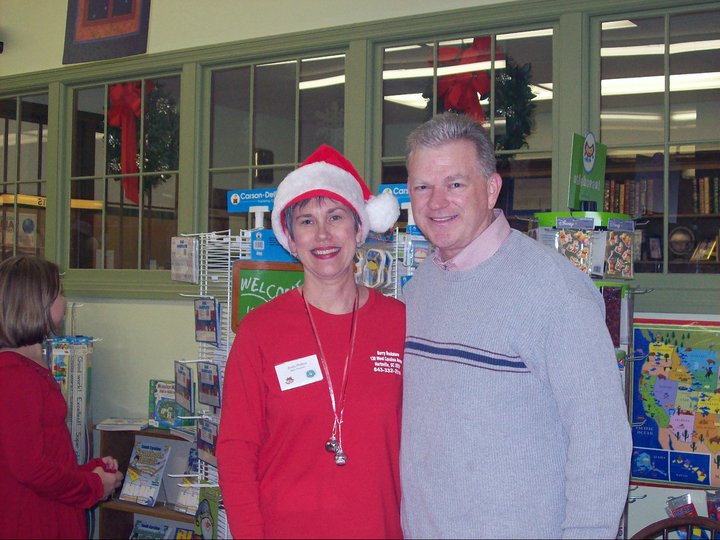 Along with promotional efforts by a
local business alliance, which ran television and radio advertising, Phillips
credits social media outreach by herself and other retailers on Twitter,
Facebook and blogs as a crucial factor in drawing the considerable crowd. Another
reason was the appearance of Bond Nickles (with Phillips, in photo), who "brought in a lot of
traffic," noted Phillips. A public information coordinator at the
University of South Carolina in Columbia and a Hartsville native, Nickles signed
copies of his children's book, A Brown
Thrasher, based on the true adventures of a baby bird brought home by a pet
cat and cared for by his family.
Along with promotional efforts by a
local business alliance, which ran television and radio advertising, Phillips
credits social media outreach by herself and other retailers on Twitter,
Facebook and blogs as a crucial factor in drawing the considerable crowd. Another
reason was the appearance of Bond Nickles (with Phillips, in photo), who "brought in a lot of
traffic," noted Phillips. A public information coordinator at the
University of South Carolina in Columbia and a Hartsville native, Nickles signed
copies of his children's book, A Brown
Thrasher, based on the true adventures of a baby bird brought home by a pet
cat and cared for by his family.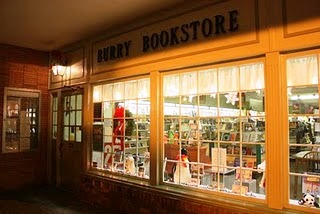 In six spacious storefront windows,
which face a main thoroughfare and are decked out with lighted snowflakes, faux
snow, a Santa figure, a nativity scene and other decorations, are different displays
featuring bestsellers, holiday-themed titles, children's books and calendars
like Ah, the Beach!.
In six spacious storefront windows,
which face a main thoroughfare and are decked out with lighted snowflakes, faux
snow, a Santa figure, a nativity scene and other decorations, are different displays
featuring bestsellers, holiday-themed titles, children's books and calendars
like Ah, the Beach!.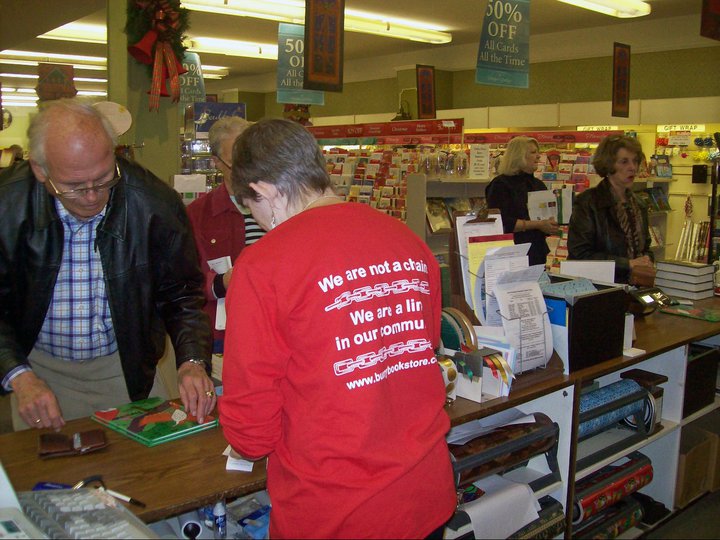 A tradition of sorts at Burry
Bookstore is a substantial purchase by a bighearted customer who selects a different
children's Christmas book each year for the more than 30 recipients on her gift
list. This year the store provided copies of Lisa Tawn Bergren's God Gave Us Christmas, along with enough
paper, ribbon and decorative gold seals to wrap all the books.
A tradition of sorts at Burry
Bookstore is a substantial purchase by a bighearted customer who selects a different
children's Christmas book each year for the more than 30 recipients on her gift
list. This year the store provided copies of Lisa Tawn Bergren's God Gave Us Christmas, along with enough
paper, ribbon and decorative gold seals to wrap all the books. 
 Step aside, Steven Knight. The Oscar-nominated screenwriter (Eastern Promises) "first took a run" at a screenplay for The Lost Symbol, but he has been replaced by Dan Brown, who is now rewriting the film adaptation of his novel for Columbia Pictures. According to the
Step aside, Steven Knight. The Oscar-nominated screenwriter (Eastern Promises) "first took a run" at a screenplay for The Lost Symbol, but he has been replaced by Dan Brown, who is now rewriting the film adaptation of his novel for Columbia Pictures. According to the  The Madonnas of Leningrad by Debra Dean (Harper
Perennial). The part of this book set in the "present" nicely
captures the bizarre, fascinating aspects of Alzheimer's, including the lack of
filters and the way pieces of memory flow in new ways--while the basic story,
set during the Siege of Leningrad in World War II, is gripping. Marina is a
guide at the Hermitage, and helps evacuate most of its treasures. Left to take
care of the famous museum, Marina continues to give tours for herself and
others, describing in detail artwork that once hung on the empty walls. If she
and others remember, certainly the treasures continue to exist.
The Madonnas of Leningrad by Debra Dean (Harper
Perennial). The part of this book set in the "present" nicely
captures the bizarre, fascinating aspects of Alzheimer's, including the lack of
filters and the way pieces of memory flow in new ways--while the basic story,
set during the Siege of Leningrad in World War II, is gripping. Marina is a
guide at the Hermitage, and helps evacuate most of its treasures. Left to take
care of the famous museum, Marina continues to give tours for herself and
others, describing in detail artwork that once hung on the empty walls. If she
and others remember, certainly the treasures continue to exist. Wallflower by Holly-Jane Rahlens (Berlinica
Publishing). The debut title by a new U.S. press specializing in books about
Berlin, this YA novel with its smart, poignant, wisecracking voice works for
adults, too. Wallflower takes place
during the course of a day two weeks after the fall of the Wall in 1989, when
Molly Lenzfeld, who is about to return to New York, decides to visit newly
opened East Berlin to see the house where her late mother, who was Jewish,
lived before fleeing the Nazis. On her long, convoluted trip via subway to the
east, she meets Mick, an East German boy a few years older--and her life
changes forever.
Wallflower by Holly-Jane Rahlens (Berlinica
Publishing). The debut title by a new U.S. press specializing in books about
Berlin, this YA novel with its smart, poignant, wisecracking voice works for
adults, too. Wallflower takes place
during the course of a day two weeks after the fall of the Wall in 1989, when
Molly Lenzfeld, who is about to return to New York, decides to visit newly
opened East Berlin to see the house where her late mother, who was Jewish,
lived before fleeing the Nazis. On her long, convoluted trip via subway to the
east, she meets Mick, an East German boy a few years older--and her life
changes forever. again, in Before the
Frost, set on Wallander's home ground of Skåne in southern Sweden, Mankell
tells a gripping story, which in this case involves an extreme religious group
bent on punishing sinners. The addition of Wallander's daughter to the police
force and the series is brilliant and leavening.
again, in Before the
Frost, set on Wallander's home ground of Skåne in southern Sweden, Mankell
tells a gripping story, which in this case involves an extreme religious group
bent on punishing sinners. The addition of Wallander's daughter to the police
force and the series is brilliant and leavening. How Rocket Learned to Read by Tad Hills (Schwartz &
Wade/Random House). A "little yellow bird" in search of a student
sets her sights on Rocket, a black-and-white dog who loves to nap. The
passionate teacher awakens the pup to "the wondrous, mighty, gorgeous
alphabet" and the rewards of reading and friendship.
How Rocket Learned to Read by Tad Hills (Schwartz &
Wade/Random House). A "little yellow bird" in search of a student
sets her sights on Rocket, a black-and-white dog who loves to nap. The
passionate teacher awakens the pup to "the wondrous, mighty, gorgeous
alphabet" and the rewards of reading and friendship.  Will Grayson, Will Grayson by John Green and David Levithan
(Dutton/Penguin). Two high school students with the same name meet by
happenstance in a Chicago porn shop. Although they could not be more different,
both Will Graysons will never be the same, due to an irresistible,
larger-than-life gay football player and musical theater genius named Tiny
(picture George Hearn in La Cage Aux
Folles as a young man). Green and Levithan alternate narratives and offer
comic moments and rare insights into male-male and male-female intimacy--of
both the platonic and romantic varieties.
Will Grayson, Will Grayson by John Green and David Levithan
(Dutton/Penguin). Two high school students with the same name meet by
happenstance in a Chicago porn shop. Although they could not be more different,
both Will Graysons will never be the same, due to an irresistible,
larger-than-life gay football player and musical theater genius named Tiny
(picture George Hearn in La Cage Aux
Folles as a young man). Green and Levithan alternate narratives and offer
comic moments and rare insights into male-male and male-female intimacy--of
both the platonic and romantic varieties.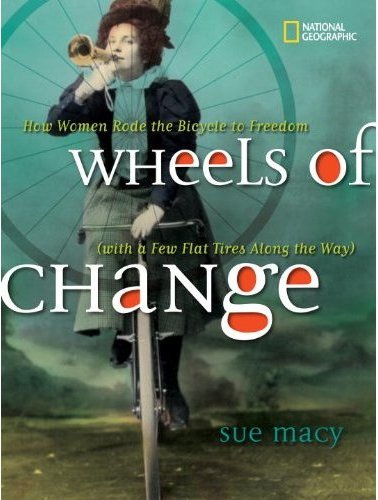 How did the refinement of the bicycle lead to a woman's right to vote? Sue Macy's (A Whole New Ball Game: The Story of the All-American Girls' Professional Baseball League) compulsively readable history traces the bicycle's ascent from 1876, when Col. Albert Augustus Pope first saw the bicycle in Philadelphia, to its plummet in 1897, when "the American bicycle boom goes bust" and the first motorized cycles began to dominate the market, then the automobile. In the intervening years, the bicycle changed the way we advertise and exercise, the way women dress, and contributed to their sense of independence. Susan B. Anthony said the bicycle did "more to emancipate women than anything else in the world."
How did the refinement of the bicycle lead to a woman's right to vote? Sue Macy's (A Whole New Ball Game: The Story of the All-American Girls' Professional Baseball League) compulsively readable history traces the bicycle's ascent from 1876, when Col. Albert Augustus Pope first saw the bicycle in Philadelphia, to its plummet in 1897, when "the American bicycle boom goes bust" and the first motorized cycles began to dominate the market, then the automobile. In the intervening years, the bicycle changed the way we advertise and exercise, the way women dress, and contributed to their sense of independence. Susan B. Anthony said the bicycle did "more to emancipate women than anything else in the world."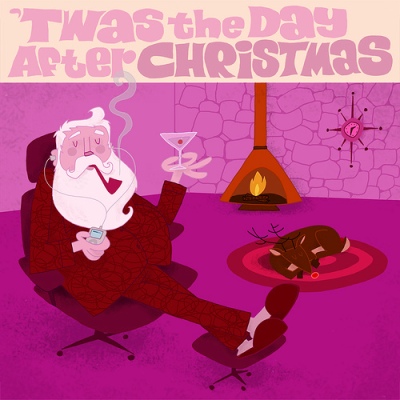 They are a memory for me now. I haven't worked in a bookstore for some time, though I can easily imagine what they will look like next Sunday, the day after Christmas, as they huddle outside the locked door of a bookshop somewhere--waiting, waiting, waiting for the clock to strike the opening hour. It's a future I can predict because I'm talking about futurist consumers.
They are a memory for me now. I haven't worked in a bookstore for some time, though I can easily imagine what they will look like next Sunday, the day after Christmas, as they huddle outside the locked door of a bookshop somewhere--waiting, waiting, waiting for the clock to strike the opening hour. It's a future I can predict because I'm talking about futurist consumers.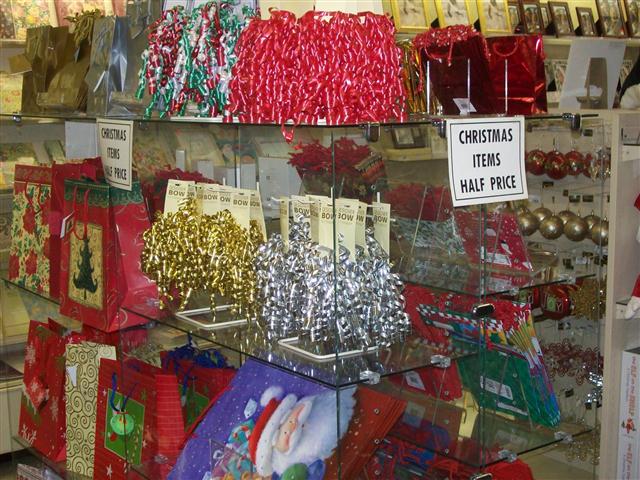 As the doors open, the hunters race--more of a slow-paced Running of the Bows, actually--toward displays featuring holiday-related merchandise discounted 50%: gift wrap, ribbon, greeting cards, ornaments and a zillion themed trinkets; all that leftover inventory the sidelines buyer was staring at, with a slightly defeated expression, while sipping eggnog after the store closed Christmas Eve afternoon.
As the doors open, the hunters race--more of a slow-paced Running of the Bows, actually--toward displays featuring holiday-related merchandise discounted 50%: gift wrap, ribbon, greeting cards, ornaments and a zillion themed trinkets; all that leftover inventory the sidelines buyer was staring at, with a slightly defeated expression, while sipping eggnog after the store closed Christmas Eve afternoon.